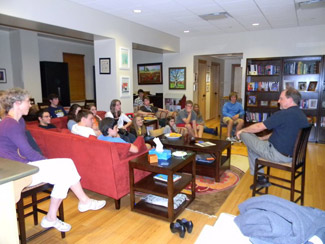Guest Blog: A Tri-Chair’s View of Committee

“But, after all, brains are not the best things in the world.”
Have you any?” enquired the Scarecrow.
No, my head is quite empty,” answered the Tin Woodman; “but once I had brains, and a heart also; so, having tried them both, I should much rather have a heart.”
― L. Frank Baum, The Wonderful Wizard of Oz, George M. Hill Company, 1900
I am one of the admissions committee tri-chairs at Vanderbilt and there are instances when I wish a computer could do my job. They are fleeting moments, perhaps a random gathering of nanoseconds when I daydream with a weightless conscious, letting a hard drive struggle over the hard choices we often make as admissions officers. I always snap out of it though. The reasons these infrequent flashes of escapism never take hold are twofold: 1) a computer couldn’t do my job, at least not yet (see below) and 2) I only sleep well knowing that our evaluation process combines the best of the brain and heart – it is deeply thoughtful in its steps, and thoroughly human.
As brilliant and as fast as we believe our modern electronics are, when compared with the human mind it’s simply an unfair fight. The new iPad 2 is quick, estimated to process information at around 1 Billion instructions per second. (Sounds fast, but in actuality that’s the processing equivalent of a lizard.) The human brain, however, can encode information from hundreds of various sources simultaneously (smells, sounds, thoughts, registering emotions and managing intermittent distractions – hey look at that squirrel) at a blistering rate of 100 Billion instructions per second. In fact, it is estimated using the current rate of growth in computing speed that we will reach singularity (the point when non-biological intelligence exceeds biological intelligence) at around 2020.
So that’s when the machines take over, and, coincidentally, when I plan to retire in my 40’s to the Seychelles.
Until then, there’s a lot a computer can’t do – and that’s why we read files and have admissions review committees. Previous posts have addressed how applications get to committee and how committee operates, but what has yet to be discussed is what exactly differentiates an applicant to the committee chairs once an application is presented in committee. Keep in mind that the students we see in committee are highly accomplished, incredibly involved and awfully similar to each other statistically speaking. My attempt at an inexhaustive list of tip factors follows:
More frequent factors
- Rigor of curriculum: not all GPA’s are created equally and we try to reward students who have challenged themselves based on what is available at their schools. The admissions officer assigned for your school helps us understand the nuances of this.
- Fit for the school or major: in essence we’re trying to answer the question, “How much would the professors in your chosen college/school enjoy having you in their classes and labs?” We actually debate sometimes what a student will be like in the classroom, what she is saying and how she is interacting with her classmates.
- Fit in The Martha Rivers Ingram Commons: There is a vital social aspect to learning at Vanderbilt and The Ingram Commons is all about learning through connections with other people (fellow students and professors). We’re trying to figure out what kind of roommate you’d be, whether you’re the kind of student who would watch “Contagion” and then Q&A-it up with renowned epidemiologist Dr. Mark Denison. Or perhaps you dig learning about sustainable art in the Fall for the Arts festival on The Ingram Commons lawn, or perhaps debating singularity with a housemate over pizza.

- Engagement with something greater than yourself: All too often, folks focus solely on the leadership positions you hold. What we’re looking for is that you sought out opportunities to contribute, and ultimately made an impact on, elements of the world around you. This could be things as simple as coaching a little league soccer team. Can you imagine what our campus would be like if everyone was student body president in high school?!
Less frequent factors
- Rarity of geographic origin: Being from a region of the world that is well represented on our campus won’t hurt you, but we will notice if you are from somewhere that is infrequently represented in our pool. That being said, rarity of geographic origin (in this instance) would still be just one of many elements of an applicant’s portrait we’d take into consideration.
- Personal hardships: While many students experience some difficulties in their life, a handful of students have overcome major obstacles that must be considered. We are less concerned with the nature of the hardship (although we take pains to understand the circumstances) than we are with how you responded to it.
Non-factors
- Gender – it never comes up
- Your financial need – neither our committee or our admissions officers even know whether you are applying (with the exception of international students) for financial aid
- How many other highly qualified students there are at your school – we evaluate you on your own merits. The fact that there are three other admissible students at your school does not make it any “harder” for you to be admitted.
The students admitted in committee are the final group to be added into each decision cycle (ED1, ED2, Regular). These are only a few of the students whose brilliance shines best through the intentional yet fluid conversation between committee members and admissions counselors.
I imagine that even when a computer is smart enough to drive me to work, we will be running admissions committees. As long as our selection process seeks to understand and predict the beautiful variance of human nature, we will sit around a table and discuss the kind of energy you might bring to our campus.
“All the same,’ said the Scarecrow, ‘I shall ask for brains instead of a heart; for a fool would not know what to do with a heart if he had one.’
I shall take the heart,’ returned the Tin Woodman, ‘for brains do not make one happy, and happiness is the best thing in the world.”
― L. Frank Baum, The Wonderful Wizard Of Oz, George M. Hill Company, 1900
By: Thom Golden, Ph.D., Senior Associate Director, Office of Undergraduate Admissions
